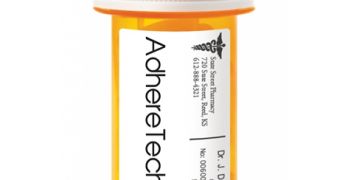The smart pill bottle uses the same technology used in touchscreen devices, with sensors implanted in the bottle's walls to measure how much medication is left in the container.
This groundbreaking product has been debuted by New York City based start-up AdhereTech, in order to fill what they believe is a gap in the pharmaceutical market.
Manufacturers performed a study that revealed that, with particular medication regimens, patients sometime take as low as 40% of their prescribed dosages, due to forgetfulness or miscalculation.
At times they believe they have already taken their pills, while other times they increase their dosage to unrecommended levels, due to the lack of an automated system that helps count their pills for them and track the times they were taken at.
"People trying to track adherence, they either rely on patient self reporting, or they do a retroactive pill count. […] It's just so archaic considering the technology we have now,” co-founder of AdhereTech, Grant Mitchell, told TheVerge.
The smart bottles employ self-monitoring, down to the equivalent of one capsule or pill, if it contains solid medication, or to one ml if the medication is liquid. When patients fill out their prescriptions, pharmacists program the required dosage, schedule, and notifications in the bottle's memory.
As patients skip taking their pill or need to refill their bottles, they are notified by text message or phone call, due to the magic of 3G technology.
Similar products adapted for this niche market were Vitality GlowCaps, released in 2011 and sold on Amazon for $10 per cap, to which a $15 monthly subscription fee was added. The GlowCaps, as the name suggests it, would notify clients they haven't taken their pills by glowing at specific, automated times.
The product was soon pulled off the market after clinical tests showed that the method was not accurate enough for ensuring that patients followed their subscribed dosage.
"It only knows if you open the bottle, not whether you take the pills. [...] Just the cap opening is more of an approximation than actually knowing what's in the bottle. [...] You don't know if the patient overdosed, under-dosed, spilled a bunch of pills, or took two instead of three," Mr. Mitchell argued, claiming their new product would solve the aforementioned issues.

 14 DAY TRIAL //
14 DAY TRIAL //